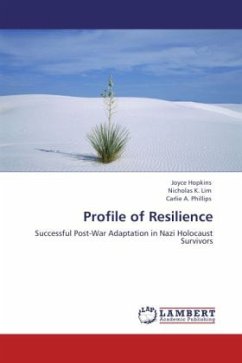How was it possible for a group of death camp Holocaust survivors to have successfully adapted and even thrived in their post-war circumstances? Despite some symptoms of PTSD, a small group of these survivors appear to have shared certain characteristics that may have contributed to their resilience. For example, they had an optimistic bias about themselves and an exaggerated perception of personal control. The women in particular were exceedingly concerned about the impressions they made on others. They also seemed to use repression in an adaptive way to bury the past and create new productive lives. Other factors appear to have been influential such as the special role the participants played in their families of origin, tightly knit social groups, daily exercise rituals, and strong religious identity. This group of survivors was closely examined to help us understand how some individuals are able to experience fulfilling and successful lives despite the experience of prolongedand intense trauma as young adults.
Bitte wählen Sie Ihr Anliegen aus.
Rechnungen
Retourenschein anfordern
Bestellstatus
Storno








